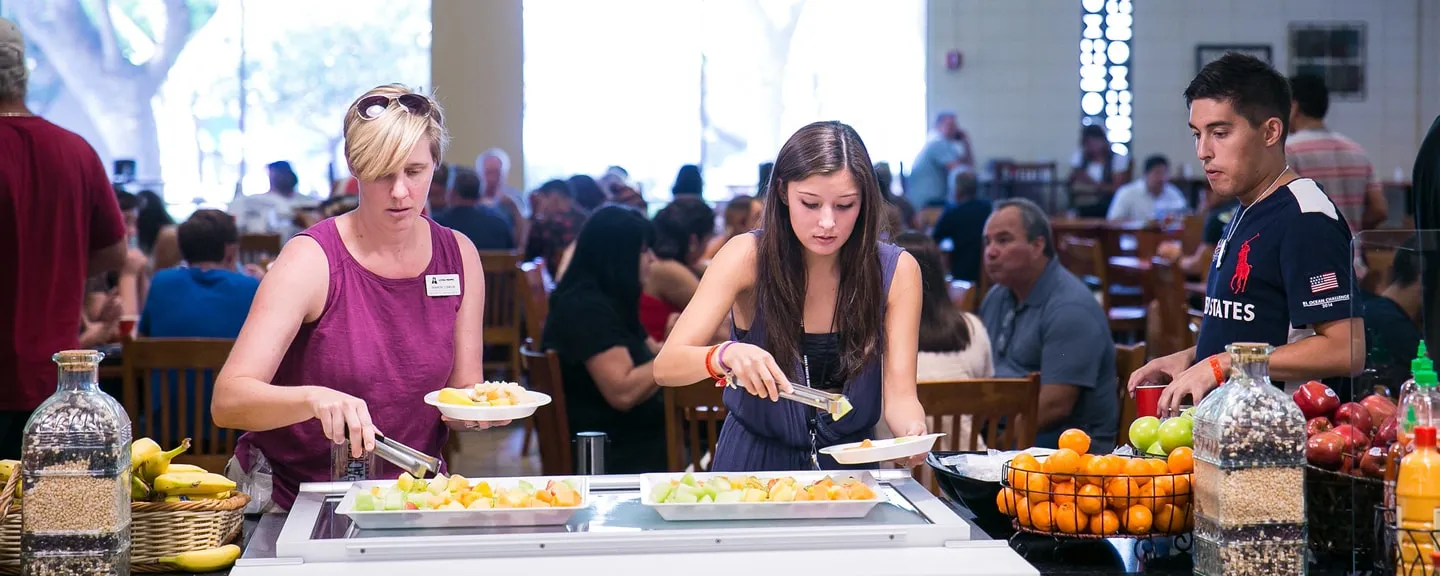- Home
- >
- APU Articles
- >
- News Article
How the College Meal Plan Has Evolved in Favor of Food Sustainability
August 20, 2019 | Written By John Montesi

That’s why making the college meal plan easier to understand and navigate is a front-and-center concern for schools across the country. Many universities have chosen to partner with food service providers who champion responsible food sourcing efforts, so that students can both take full advantage of their college meal plan and feel good about what they’re eating.
Knowing Where Your Food Comes From
Understanding how food is sourced is integral to making impactful dining choices—and Kari Menslage, regional marketing director for Bon Appétit Management Company, knows that many students want to make the right decisions. In underscoring the importance of ethical food sourcing, she stresses how her company consciously sources to universities and educates not just students, but on a large scale.
“We think knowledge is power,” she says. “We look at the food system holistically and are continuously working to make sourcing choices that support local economies, treat people and animals with respect, and minimize harm to the earth.”
Bon Appétit continually endeavors to make choices that benefit the business, its clients, and their areas, Menslage notes, such as prioritizing food education. She said she believes that when food is presented with knowledge and insights, it allows diners to understand the choices they’re making while trying new cuisines that align with their preferences. What’s more, it gives students an opportunity to open their minds to new cultures and healthful practices, and gain a deeper appreciation of the global impact made by their individual choices—all while using their college meal plan.
Responsible Food Sourcing and Its Impact
Responsible food sourcing is centered around making choices that are sustainable and socially conscious while providing nutritious (and delicious) food options. Menslage explained that Bon Appétit’s sourcing policies are driven by its founding principles of environmental and social responsibility, and its core belief that the choices made today will absolutely have an impact on future generations.
“Here’s how we define food service for a sustainable future: Flavorful food that’s healthy and economically viable for all, produced through practices that respect farmers, workers, and animals; nourish the community; and replenish our shared natural resources for future generations,” Menslage says. “By sourcing food using these values, we believe we can help build a food system that is stronger, more resilient, and better for people, animals, and the planet.”
Offering Sustainable Choices with a College Meal Plan
Azusa Pacific University partners with Bon Appétit for its campus dining services because of the company’s steadfast commitment to responsible food sourcing and preparation. The measures the organization takes to ensure its practices are sustainable are numerous (and still growing). It would be difficult to seek out comparable meals and ingredients as a time-crunched, cash-strapped student. But at APU, they only have to look as far as their nearest dining hall.
Many dietary needs and restrictions are catered to with an APU meal plan, and there’s clear labeling on ingredients as well as sourcing information posted at every dining hall. Menslage explains that the Circle of Responsibility icons found in APU’s cafés indicate meal selections that align with a variety of diets, such as vegan, vegetarian, farm-to-fork, humane, and made without gluten-containing ingredients. This makes it easy for students, faculty, and staff to eat according to their preferences at every meal.
“Our on-site managers are also a great source of information about specific ingredients,” Menslage continued. “The importance of knowing where your food comes from is different for every person and is often based on an individual’s core values.”
Curious to learn more about the many dining options available to Azusa Pacific University students? Learn more about APU’s dining plans and dining venues, its ethical sourcing efforts, and more.